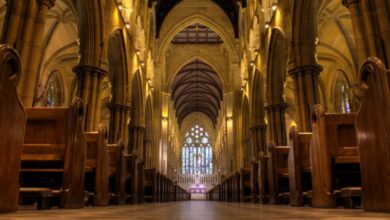Graduate school hopes new education program will help with ‘renewal’ of Catholic schooling
 null / Credit: Billion Photos/Shutterstock
null / Credit: Billion Photos/Shutterstock Washington, D.C. Newsroom, Sep 10, 2023 / 07:00 am (CNA).
A western U.S. Catholic institution is debuting an education degree program meant to train up teachers and administrators in what one official says is the “embrace of more traditional forms” of Catholic education.
The Augustine Institute in Denver says on its website that the organization exists to serve “the formation of Catholics for the new evangelization” by “equip[ping] Catholics intellectually, spiritually, and pastorally to renew the Church and transform the world for Christ.”
The institute, founded in 2005 as a Catholic graduate theology school, currently hosts a little over 300 students. It hopes to add several hundred to its newly formed MA in Catholic Education program, which is debuting with a “soft launch” in October.
Christopher Blum, the institute’s provost as well as a professor of philosophy and theology, told CNA the program is meant to serve as “a contribution to the ongoing renewal of Catholic schools.”
Many Catholic schools across the country are increasingly turning to “classical” forms of education, which focuses on liberal arts such as grammar, rhetoric, geometry, astronomy, and other historically celebrated forms of learning. Catholic schools who adopt this model of curriculum do so with an emphasis on Catholic teaching, scriptural study, and abstract yet well-studied concepts such as truth, goodness, and beauty.
A growing number of Catholic institutions have been adopting this style of education: The Diocese of Marquette, Michigan, for instance, became in 2020 “the first [diocese] in the nation to fully move all of its schools to a classical Catholic curriculum.” Schools in Colorado, Washington state, Kentucky, and numerous other states have moved toward this model in recent years as well.
Blum said the new Augustine Institute program was founded with “an explicit commitment to the new evangelization and the embrace of more traditional forms of education.” He said though that style of pedagogy is most often referred to as “classical,” the more accurate descriptor is “Catholic liberal education.”
The program is “grounded in Scripture and Catholic doctrine,” Blum said; it “offers pedagogical training from a Catholic and classical perspective” and allows students to specialize according to their own area of teaching, with concentrations in grammar school, classical pedagogy, humanities, science and math, and catechetics.
Tim Gray, president of the Augustine Institute, told CNA there was considerable interest in the program prior to its development.
“Bishops were asking us: Hey, can you provide us with something more focused on education? It’s a huge need,” he said.
Gray said they already have a sizable class signed up for the inaugural program.
“It’s a mix [of students],” he said. “We’ve got pastors who say, ‘I’m starting, or just started, a classical education school, or we’re renewing our Catholic school and we want to get our faculty on this.’ We have a lot of schools that want to send their teachers as cohorts. We’ve also heard from individuals.”
“Some [students] are just getting out of undergraduate, maybe it’s a teacher who wants deeper formation,” Gray said.
He estimated that the program will draw in “a couple hundred students in three years.”
The ongoing school choice movement, Gray suggested, will generate considerable need for more teachers in Catholic schools.
“A lot of these voucher programs in red states — that is going to bring in a wealth of students and money for Catholic schools,” he said. “So they need to train people up.”
In places where school choice has been expanded, Catholic schools have frequently benefitted.
In Iowa, Sioux City Bishop R. Walker Nickless said earlier this year that a major school choice program there would “help parents keep their child in the Catholic school of their choice and assist us in enhancing quality education.”
The Florida nonprofit Step Up for Students, meanwhile, reported last month that choice programs there were helping to drive Catholic enrollment, with “the number of students using state-funded school choice scholarships to attend Florida Catholic schools [having] tripled over the past decade.”
Blum noted that the MA program is “not a conventional education program” and “does not prepare students for state licensure in any of the 50 U.S. states.” However, it will “welcome students who are preparing for a career as teachers,” he said.
The program, meanwhile, has high entrance requirements, including at least a 3.25 GPA, a “demonstrable ability to read and synthesize insights into thoughtful written work and expression,” and a “commitment to evangelization and the renewal of education.”
The other key requirement for aspiring applicants: a “strong Catholic identity.”




